We’ll discuss:
Note: No tourist visa is necessary to visit Panama for most tourists*. To enter Panama, you only need:
Wherever you enter Panama, the immigration official will put a stamp on your passport stating you can be in the country for 180 days.
NOTE:
You qualify for this type of visa if you receive at least $1,000 per month from a pension, retirement fund, or other types of reliable income source. Don’t receive that much? If you buy a property for at least $100,000, then you only need a monthly retirement or pension income of $750.
Since August 2021, this friendly and easy-to-get visa is not nearly as friendly or easy to obtain. To qualify, you must be a citizen from one of the 50 friendly nations* and must either buy a property in Panama for at least $200,000 or be employed by a Panama company professionally.
*Citizens from any of the 50 nations considered “friendly” to Panama can move here with their immediate family and acquire a permanent residency visa. Andorra, Argentina, Australia, Austria, Belgium, Brazil, Canada, Chile, Croatia, Cyprus, Czech Republic, Denmark, Estonia, Finland, France, Germany, Greece, Hong Kong, Hungary, Ireland, Israel, Japan, Latvia, Liechtenstein, Lithuania, Luxembourg, Malta, Monaco, Marino, Montenegro, Netherlands, New Zealand, Norway, Poland, Portugal, Serbia, Singapore, Slovakia, Spain, South Africa, South Korea, Sweden, Switzerland, Taiwan, United States of America, Uruguay, United Kingdom (Great Britain & Northern Ireland).
A fast and affordable visa to obtain, but only good for 18 months. However, if you are a remote worker, who earns at least $36,000 a year from that work, you should consider applying for a Panama Digital Nomad Visa.
All of the reforestation investments must be held for a period of 5 years, and they can be made in your personal name or in the name of a Panama entity, corporation, or foundation.
This has three options to qualify for this visa created to attract wealthy foreigners
If you're an Investor, you have 3 options to obtain expedited (30 days) permanent residency in Panama (leading to citizenship and a Panama passport after 5 years) with this program
If you have been offered a job in Panama, you will need to apply for a work visa that allows you to reside and work professionally within the country. It is important to check with your employer or a professional lawyer as to what other documents and information may be needed for the work visa application process.
Whether you want to stay in Panama for a short vacation or move here permanently, there is a visa that is right for you. If you have any questions about which type of visa you need, I would be more than happy to provide guidance.
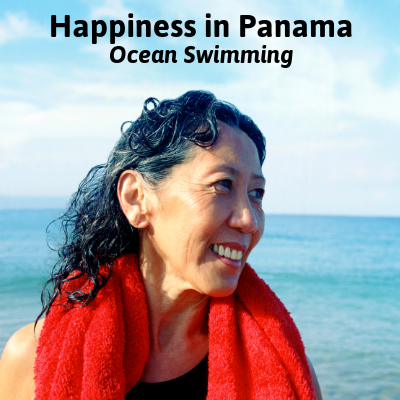
Most likely you saw people standing in the water, chest deep, waiting for a wave to come. They would body surf the wave in, or simply jump up and over the wave while shrieking with glee.
Then, once in a great while, you may have noticed - way, way (way) out there - beyond the breaking waves, the steady stroke of an arm.
And you realize that there is an actual human being out there in the ocean. All alone. Swimming!
“Yes! By God! It’s one of those lunatics - an open-ocean swimmer.”
If you are like me, you may have thought:
By this point, you are beginning to relive scenes from the movie Jaws. Your eyes have glazed over and you are breaking out in a cold sweat, as you imagine that it is you out there in the water about to be eaten. Finally, you must force yourself to stop thinking about it altogether.
Since arriving in Puerto Armuelles in late 2006, I have revisited these fears, as well as other prior, harsh judgments about ocean swimmers and ocean swimming. This was actually forced upon me.
You see, I am by nature a daily exerciser. I can get by without exercise. However, I definitely feel my happiest, most optimistic when I exercise a moderate amount every day. Ideally, for 20-40 minutes a day, sometimes a bit more.
For the 1st decade we were in Puerto Armuelles, I surfed. That is, whenever there were waves. Generally, there is surf here about 1/3 of the mornings, 5 months of the year.
(FYI: surf season in Puerto is usually April thru October, although we can have a swell in other months.)
Surfing was not a moderate amount of exercise for me. I was already in my late forties when I took it up, and I rode a pretty shortboard, which required a lot of paddling effort. Also, I would usually get so interested (aka “obsessed with”) catching “just one more wave” that I could easily find myself in the water for 2 hours or more if the waves were good.
For some people, this is not too much exercise. For my aging body, it was definitely a lot of exercise, certainly more than I required for health and happiness. Although, after an early morning of good surfing, I always felt wonderfully relaxed.
Even before I phased out my daily surfing, which happened about a year ago, I relished the days without any waves. Then I would go for a casual swim and give my body a bit of a break. (I still haven’t completely quit surfing, because surfing is really, really fun!)
I swim for the fun of it, as opposed to surfing which, although very fun, was also “my other job”. If you talk to surfers, you will find that many of us are the same. Surfing is not just for fun - it is a daily need. (It is probably not that different from smoking crack cocaine. Except that we don’t hang out on the street corners and surfers generally look like fit athletes, rather than addicts.) The bottom line with surfers is that if we don’t get our quota of waves, we quickly begin to suffer withdrawal symptoms. We just can’t enjoy our day as much.
Swimming for me is a lot less of an addiction. It is more of a daily meditation practice. For me, swimming is about the journey and not about the destination. I suppose, if I took swimming seriously enough, it could also become a “job”. But I don't want to make it into that.
What I find is that ocean swimming in Puerto is the absolute easiest way for me to get into touch with the present moment. To just “be” with myself, and with nature.
What makes Puerto Armuelles such a good place to start ocean swimming?
If you look at my list of the things that seemed so unnatural about the “lunatic open ocean swimmer” in my earlier description, you will notice that I mentioned:
Fortunately, none of these inconveniences is present here in Puerto Armuelles.
1). The water in Puerto is always bathtub warm (78-85 degrees Fahrenheit)
It is amazing just how big a difference it makes to swim in warm water. The experience is not intimidating, or alien. You feel as if you belong in the water, as if you were born there…and if you think about it, you were.
2) The water is shallow
Because of our gently sloping sandy beach and the fact that we have no waves for much of the year, you only need to wade out into the water a bit over knee deep in order to start swimming.
If you swim parallel to the shore, you never have to swim in water that is over chest deep.
To me, this is reassuring. Although I have spent a lot of time in deep, dark cold ocean water, I have always found it a little scary. Those are the places where sharks hang out waiting to eat a seal or sea lion. I have always been very careful not to let my mind wander too far into “What if?” when in those deep cold water.
I must admit that I feel most comfortable in warm water about waist deep, or not much deeper than I am tall. Thankfully, the little swathe of the ocean where I swim, right in front of Corazon de Oro is the perfect depth for me.
3) No man-eating (or woman-eating) sea creatures.
A few years ago, when I was still kiteboarding, I did a brief study of shark attacks in around Puerto Armuelles. I wanted to know just how big a risk I was taking every time my kite went down offshore, and I had to swim in.
To my great relief, I found that there has only been one recorded shark attack near Puerto Armuelles. (However, the story has been retold so many times that you would think that a 100 people had been attacked and eaten, just last week).
The story that I heard goes like this. A man diving for conch was attacked by a large shark about 30 years ago out at the tip of Punta in about 65 feet of water. According to reports, the man lived for years after the attack and continued to dive for conch.
Please note: Punta Burica about 10 miles away from Puerto Armuelles. It is by the open ocean with rocky ledges that drop off abruptly from shallow reefs, to open ocean 100s of feet deep. Diving for conch every day, day-in-and-day-out, for a lifetime, in the deep open ocean, is quite different from swimming a few yards off a sandy beach for 30 minutes each morning. All the locals in Puerto, with whom I have spoken, agree that they have never, ever seen a shark, (ever). There are certainly no recorded shark attacks at any of the beaches in Puerto Armuelles.
4) The beach is usually sandy & the early morning ocean is often flat.
It makes walking out into the water more pleasant. You won’t need any special footwear.
It also makes it easier to swim. Especially in the summer, the water is flat as glass in the mornings. (In Puerto, they say flat as “espejo”, which means a mirror). Which is very pleasant.
This perfectly flat water makes stroking and gliding much easier. Perfect for any swimmer. And especially easier for someone just getting started with salt-water swimming.
5) Salt water is wonderful.
Not only does it make you feel healthy (no chemical aftertaste). It also makes you more buoyant. This means that even a skinny guy like me can float, at least a little bit.
Plus the salt water makes it much easier to swim well. You won't be struggling to maintain a neutral, horizontal position in the water. You can more easily find that “sweet spot”, or ideal balance in the water.
If you are skinny, like I am, wearing a slightly buoyant rash guard or wetsuit top, as I do, will make it even easier.
6) You will most likely have the beach to yourself
The beaches in Puerto are often empty of people. Which means, if you are a shy beginning swimmer, there is no one out to judge you. (Plus, if you are around my age, you most likely have realized that no one is watching you anyway—-and they never were. We just thought they were.)
7) No chlorine!
If you have tried to swim in a pool, but were unable to tolerate the intensity of all that chlorine, you will appreciate the complete absence of it. It is so nice!
8) Quiet and in Nature
Indoor swimming pools are NOISY! It is deafening to be in such a large space where every surface is hard and reflective.
I find the noise, the cold, the chlorine, and the total absence of nature, to be big detractors from the experience of at most swim pools. It is a totally different experience when you swim in the ocean.
After years of swimming in Puerto, I still favor swimming on my back for long stretches of time. It is a lot more relaxing. I don't have to think about coordinating my breathing with my strokes.
Plus, an added benefit of swimming on my back is staring up at the sky. I can enjoy watching nature, for example:
I have had some incredible moments when I am just suspended there “in the zone” while swimming parallel to the beach. This is a magical, meditative time for me. I am just being. The world is the star of the show. I am simply taking time out to observe, gratefully, a tiny slice of it.
How did I get started? I suppose as with most things I’ve done, I just started.
At first, I was terrible. But I didn’t give up. Then, later, I learned a little bit about what I was doing, and my efforts began to pay off.
Of course, this is all relative. I am still not a great swimmer. However, I enjoy swimming, and I think that I am still improving, little by little. Swimming well is not a preoccupation for me. The main thing is that I am able to participate in this great activity. That is all that I really wanted out of swimming.
Google is your friend
Now, it is likely that you are different than I am. You probably want to learn how to be a competent swimmer, before you start swimming in the ocean. (It’s okay. I get it. Following a logical course of action is an admirable quality.)
If you want to be a better swimmer, faster. I recommend that you do the same thing you would do if you wanted to learn anything. GOOGLE IT!. There is all kinds of information about getting started swimming, swimming for adults, triathlon swimming, and thankfully, even open ocean swimming for beginners.
So, just hit your computer, and do some “armchair swimming”. I actually believe that you can learn a ton about swim technique, just by watching online videos.
If you break what you learn down into small “chunks” and only practice one technique at a time, you will be amazed at how much you will improve.
As you browse the available information online, you are bound to come across a swim course called Total Immersion Swimming. A friend of mine told me about it years ago. After swimming in Puerto, I finally signed up for one of their weekend swim classes, during one of our visits to Seattle.
After taking this course, my friend participated in iron-man competitions, which includes a 2.4-mile swim, a 26.2-mile marathon, and a 112-mile bike race. I am in awe of anyone who can sustain that level of intense exercise. But, I was blown away when he said that he was able to keep up with “the pack” at the front of the race in the open ocean swim, despite the fact that he had never swum on a team in high school or college. “How the #$%@!#$ do you do that?”, was my obvious question. "Total Immersion Swimming", was his response.
A friend of Betsy’s sister, who took the course with me, improved greatly after taking the course too. Upon completing the course, she began to regularly swim across Seattle’s Lake Washington, and back (over a mile), with a group of similarly skillful swimmers.)
What I learned from Total Immersion Swimming
My own improvement after taking the Total Immersion Swimming weekend intensive was far more modest than my friends. But, I learned a lot from their weekend course. Most importantly, I learned a handful of techniques that gave me a standard to shoot for every time I swim. However, my execution, particularly my ability to breath efficiently is still very much a work in progress.
The part where I felt the most growth (not surprisingly, this is also the part that I like best) was the ability to sense whether my body was in a state of balance in the water. I had never before thought of swimming as balancing my body in the water. This concept alone, without any swimming techniques, is reason enough to be grateful for taking the course. Balancing one’s body in the water is amazing!
When you see a video of yourself swimming at the beginning of the weekend course, you can’t believe you were not swimming in what you thought was a very horizontal position. You were actually swimming in a half horizontal, half-vertical angle. That is you were swimming at a 45-degree angle through the water - dragging half the water in the pool along with you. No wonder you feel exhausted after just a few minutes. My own video at the beginning of the weekend course, was pretty appalling (which was good, since it left me so much room for fast improvement). I could go on about it, but if you are interested, you can learn more online. (FYI, I don't make any money recommending Total Immersion Swimming, I just love it.)
Now, I can swim for about 20 or 30 minutes without stopping. And I enjoy my swim completely.
My daily ocean swimming has enhanced my health, happiness and overall quality of my life here in Puerto Armuelles.
If you are looking to explore more ways to be "Happy in Paradise", I recommend giving ocean swimming a good, thorough try.
You may also find that it makes you healthier and happier too.
Thanks for reading
Reyn
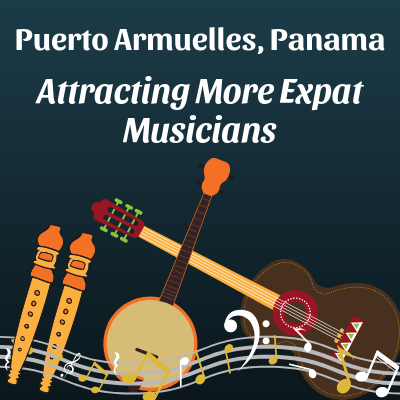
Over the past several years, I have noticed a steady stream of expat musicians arriving in Puerto Armuelles. I am not exaggerating when I say that I have met at least 6 new expat musicians who have moved here in the past year or two. No doubt there are others whom I have not met.
One expat musician, as you will see below, is offering to teach adults the recorder.
In the Corazon de Jesus neighborhood, there are 2 really good guitar players who live side-by-side in remodeled Panamanian concrete block houses. This is of particular interest to me since I have taken up the guitar as my “old guy hobby”.
Just this past week, I spoke on the phone with a couple who are curious about venues for performing their music in Puerto. They will be visiting Puerto for the first time soon.
So far, we have not had any sort of “open mic” nights in Puerto like the ones in Volcan or Boquete. However, with the arrival of so many musicians here perhaps a regular open mic event could be organized.
I know that Heavenly’s Hotel (Now Big Daddy’s) did have a few musical performances by local expat musicians. However, such events were not regularly scheduled. I will talk to Dave, one of the owners of Big Daddy’s Hotel, to see if anyone has expressed interest in performing lately. Hopefully, Big Daddy’s would welcome such a regular event. Come to think of it, Dave plays the drums. He doesn’t perform, but he loves music.
In Puerto’s Coronado neighborhood there is a family of musicians, Melinda, Ingrid, and Melinda’s son Ramy. They all play guitar. However, Melinda’s passion is the banjo. Not surprisingly, Melinda, in particular, is very enthusiastic and knowledgeable about bluegrass music.
Some very good news is that Ingrid is offering recorder lessons for interested adults. She is a retired music teacher from Anchorage, Alaska. As I mentioned above, Ingrid also plays guitar.
The recorder is a great instrument for learning the basics of music. And you can take it as far as you want to go. Ingrid has brought a number of alto recorders with her to Puerto so that she can assist those who want to give it a try.
(FYI, a basic recorder is easily purchased in Panama since the recorder is taught to most students sometime during elementary school.)
With luck, maybe she can even get a little recorder ensemble together. That sounds like fun.
If you are interested in lessons, contact Ingrid Lindberg of Puerto Armuelles via Facebook.
I'd be interested in taking up the recorder again. Many years ago, my brother and sister-in-law, both musicians, gave our family an assortment of recorders. We brought them down to Puerto over a decade ago, hoping we would starting playing the recorder. But it never really interested our kids nor my wife. (I had played a recorder for a couple of years as a child. I can’t have forgotten it all, I hope.).
I am going to dig through our various boxes of “stuff” and find those recorders. Then, I am going to get in touch with Ingrid to start re-learning the recorder. My attitude is that it is never too late to start to play music.
If you are a musician, or if you are interested in getting started playing music, please let us know. We'd be happy to steer you to others in Puerto who share your passion.
Thanks for reading, Reyn
Interested in Creating Art?
Check out more happiness-enhancing hobby suggestions
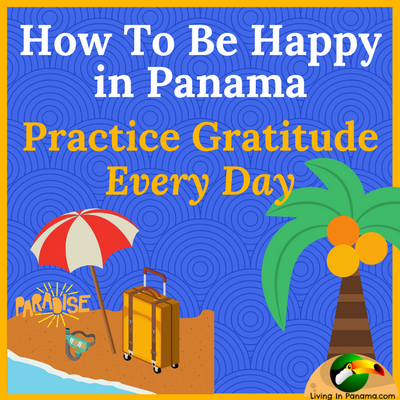
We knew, in our hearts, that if only we lived in Paradise, we would automatically be happy 24 hours a day, 365 days a year.
Even our dreams would be perfect
(And best of all, we would remember them!).
For our part, Betsy and I try to do everything we can to encourage people to take a deep breath, slow down, and not to rush the process.
We want to help potential Panama expats to make sure that theirs is not a rash, emotional reaction to just having finished a whirlwind tour of sandy beaches, luxury hotels, and afternoon cocktails all over Panama. Then climaxing in an impulsive decision to sign a purchase contract. And then find themselves suddenly living in Central America for the rest of their lives. Perhaps wishing that they had never left Cleveland, or Indianapolis, or Toronto.
There is nothing wrong with Central America, per se. In fact, there is a lot of good to be found in
However, none of these “little perks” should be confused with HAPPINESS.
After all, we are not actually moving to the tropics for birdsongs, warm sands, and beautiful sunsets. Most of us, if only in our secret hearts, are moving here because we want to be HAPPY. Because without happiness, we have nothing.
For some people, what they find in Panama is the perfect recipe for them to pursue their ongoing happiness.
For others, a move to the tropics will prove to be isolating, disorienting, alienating, and ultimately tragic move.
However, in all fairness to the tropics, for some of these unhappy people, their own personal life trajectory was inclined toward unhappiness before they arrived in Panama. So tropical living cannot really be blamed. For people in that situation, finding themselves retired and living in an unfamiliar environment, only contributes to their isolation and negative mindset. Also, some expats’ loose interpretation of when the "cocktail hour” begins can greatly contribute to their ultimate state of unhappiness, all while living in Paradise.
Happiness is something that every person on earth is interested in. However, happiness comes more easily for some, than for others.
I have generally been a pretty happy person. However, I have to admit, that I have always found it easier to be happy when things are running smoothly. I guess I am like a lot of other people in that I prefer to have things go my way. When that happen, it is easier for me to feel gratitude. I definitely notice that I get a “jolt” of happiness when I am grateful for something.
Gratitude is a sense that there is abundance, and that all is well with the world. It means that I am being taken care of, or at least regarded as being worthy of consideration.
A very simple example is seen in the following instance. I go to eat in a restaurant where the service and the food are excellent. I am very appreciative, so I feel inclined to leave a big tip for the waiter. I might even thank the owner of the restaurant personally. Asking them to thank the chef for a wonderful meal. I thoroughly enjoy the event. I feel HAPPY.
It seems pretty obvious to me that my state of happiness derives from my having received something I wanted, a good meal.
I think that most of us can relate with the notion of happiness deriving from our having received something that we wanted. We want something, We get it, We feel happy. And we are therefore grateful for our good fortune. This seems obvious.
However, there is a whole school of psychology which declares that we have it all backwards.
Positive Psychology posits that our happiness derives, in fact, not from having gotten something we wanted, but from the feeling of GRATITUDE that infuses our entire being for having gotten that “something” that we wanted.
Positive Psychology suggests that I don’t actually need to get anything that I want, in order to feel that magical “buzz”of gratitude. I can manufacture gratitude, right here at home, in my very own mind, and in my heart. Best of all, I can do this all the time.
According to positive psychology theory, the gratitude that I produce in my mind, artificially without the stimulus of having actually received anything tangible, is just as potent in triggering the happiness as the gratitude that arises from having received something tangible, and desirable. It can just be produced in our minds, by our own willpower. Of course, this willpower can be greatly enhanced, if we practice feeling grateful every day.
To see proof for this theory, we need only look around us. You see many people who appear to have everything that a human being could possibly desire, yet, these fortunate people are desperately unhappy. On the other hand, we know people who suffer great poverty, or terrible health, or family tragedy, and yet they are deeply happy. How do these happy people do it?
How, you might ask, does Simulated Happiness Theory relate to our decision to move to the tropics?
Well, it is not surprising that many of us who move to the tropics assume that by moving here, to our very own private piece of Paradise, we will experience far greater happiness than we could have by staying put in our previous location.
What is surprising is the number of people whose experience of life in Paradise falls far short of the life that they had envisioned, in terms of their overall happiness.
This happens primarily because these people have the happiness/gratitude connection reversed. They are caught in the false model of happiness that says that when everything finally begins to go their way (as it should), they will then, and only then begin to feel happy and grateful.
Those of us who have discovered the technique to cultivating our own happiness, realize that we might have waited many lifetimes for happiness to suddenly arrive on its own.
Once we realize that happiness is not an end result, but an ongoing effort, we are able to control our own happiness. It is not up to the specific ups and downs of our day.
Believe me, even here in Paradise, days have their inevitable ups and downs. But my happiness does not have to gyrate up and down like a yo-yo, depending upon what is going on in my day.
Happiness, like any worthwhile goal, requires effort.
Surely one would not expect to learn to speak Spanish just by waiting for Spanish language fluency to spontaneously arrive in your brain. It is the same with learning a musical instrument, or learning to meditate.
If we invest as little as 15 minutes every morning in practicing gratitude, we will very quickly begin to feel happier.
If you haven’t tried this, you will be amazed. This good feeling just grows, the more we practice. It doesn’t go away with the arrival of illness, or the death of a loved one. It doesn’t go up and down with the stock market. If we practice cultivating feelings of gratitude, every day, for 15 minutes, we feel much, much happier.
This practice does not require moving to Panama; You can do it right there in New York, or Seattle, or Detroit.
If you wake up in the morning and express your “thanks” to God, or whatever your higher power might be, for the mere fact that you are alive for another 24 hours with all its joy, sorrow, sunshine, and rain, then you are off to a good start to experience a day filled with Happiness.
One thing you will notice in Panama is the number of locals who, when asked “how’s it going?, will respond,
“Very well, thanks to God” (Muy bien, grasias a Dios).
For years, I just let the significance of this seemingly perfunctory response go right by me. It was just what Panamanians said, because of their Catholic/Christian background. It did not apply to me.
However, as I have delved deeper into my practice of gratitude, I have discovered that I also wanted to join in the group who gives thanks to God every time I am asked “How’s it going?”.
Now I say, "Muy bien, grasias a Dios" too. (Very well, thanks to God).
Just by speaking those words, I feel much better. If I were having a less than perfect moment in my mind, these simple words set me straight right away.
It doesn’t matter that my precise interpretation of God may be different from someone else’s. What matters is that I am taking this opportunity to vocalize my gratitude for all that I have today. I have a lot to be thankful for .
Mostly, my days are wonderful. I have my health. I have my wife Betsy. I have my children, Skylar and Blaise. Oh yeah; I almost forgot the least important item on my gratitude list; and I live here in Paradise.
What could I possibly have to complain about? The answer: Nothing.
As long as I don’t go searching for something to feel bad about. If I continue to look for and to focus on the good things in my life, and remember to practice GRATITUDE every day, my days are generally excellent!
Thanks for reading.
Reyn
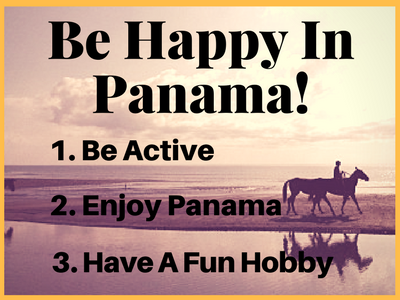
In this post, I will touch on some of the many hobbies you can enjoy here in Panama.
This is because an important trait among the happier set here in Puerto is that they have a hobby or several activities, that they pursue on a regular basis.
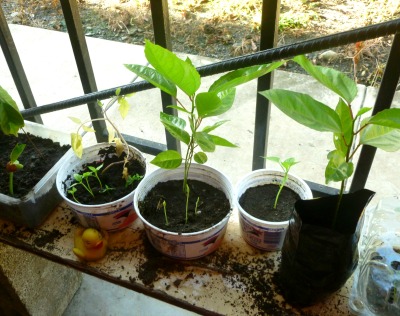
Many of our expat retirees in Puerto Armuelles are passionate gardeners.
Here in the tropics, it is much easier to garden successfully than up north. With many species of plants and trees, you just get a cutting of the plant you want, stick it in the ground, and it will grow. No kidding.
For those who love to get their hands dirty in the garden, there is ample opportunity to do it here. For heavy tasks, or for general maintenance, one can have your gardener do the work.
If you like to garden, it is also easy to cultivate some of the food for the table. Many types of fruits, in particular, grow in our tropical climate. It is easy to grow papayas, bananas, mangos, pineapples, bananas, passion fruit, etc. etc…the list is long.
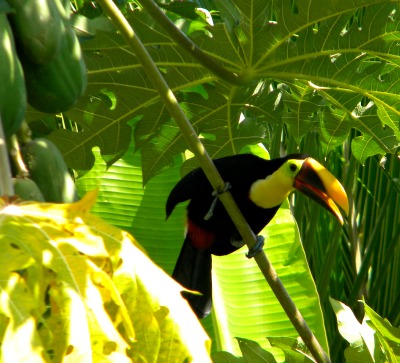
Gardening can easily be expanded to include bird watching. Many species of tropical birds pass right through our gardens in Puerto every day. Huge, noisy swarms of giant parakeets careen through the neighborhood at dawn and again at dusk. We have a barred owl living in the mango tree in our yard. We have seen a tiny pygmy owl on several occasions. We have seen a pair of toucans in our papaya tree on numerous occasions.
You can plant a garden that provides ideal habitat for birds. You can do this planting many of the plants that the birds that you want to attract to love. Add to this both feeders and bird baths and you will be visited by many tropical birds.
Panama is a bird watcher's paradise. And not just in your backyard. You can cultivate an active life, as well as an active social life as a bird watcher. There are bird watching clubs in Boquete, Volcan, and Panama City with scheduled outings to look for birds. Some of these outings are easy strolls, and others include extended trips to the less explored parts of Panama.
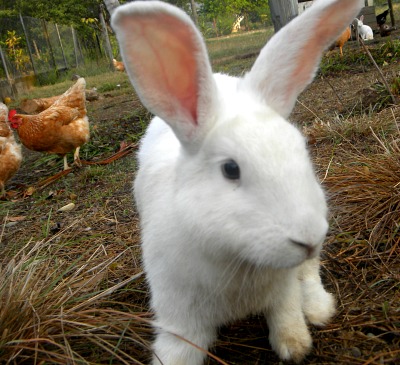
Many expats raise their own chickens, rabbits, pigs, cattle for the table. Some others just like to have animals around to keep the homestead feeling “homey”.
At one point, when our daughter Skylar was interested in raising animals, we had over 20 chickens and 20 rabbits running around in a fenced off part of our property in Las Palmas. We even had a horse for a while.
Horseback riding is always available here. Many houses have properties large enough to provide feed grass for a horse, or two
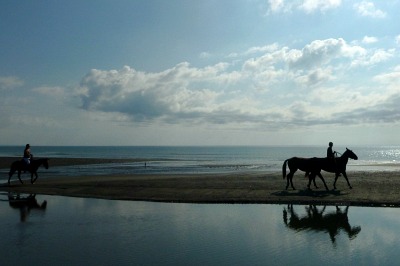
most of the year. In the driest months, you can let your horse out to graze nearby. There are hundreds of miles of dirt roads and riding trails around town, some trails lead up into the foothills, and one can ride over to the beaches on the Costa Rican side of Punta Burica in half a day.
There is a woman named Veronica who lives up the hill from us in Las Palmas neighborhood of Puerto who teaches riding and who is helping to develop a national equestrian program in Panama. You can see a video she did about her life in Puerto Armuelles.
We also know at least one expat, Russell, who has joined a local rodeo team and competes in calf roping competitions on the weekends (this is not a hobby you would want to pursue unless you are an expert rider and are fearless). A neighbor of ours raises and trains horses.
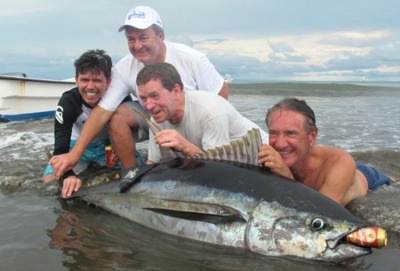
Panama means an abundance of fish. So there is a lot of fishing here. You can fish from a boat, a paddle board, kayak, raft or from shore. You can fish to your heart's content here. And many people do. My older daughter Skylar loves to fish. She once caught a fish in Panama using only a piece of plastic bag as bait.
You can even splurge occasionally and go to one of the many sports fishing lodges in Panama. One lodge, Hooked on Panama, is only 6 miles away (30 min drive) from Puerto Armuelles.
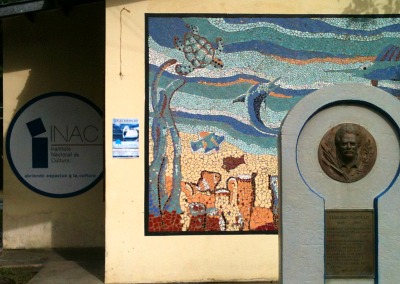
Retirement in the tropics is the perfect time to take up painting, or drawing, sculpture, or any of the visual arts. Maybe you were an artist when you were younger, and just need to break the inertia to get back to it.
Our daughter Skylar took painting and drawing at the local Centro Bellas Artes (fine arts center). They offer a number of classes for adults. Which is also a great way to practice your Spanish since the classes are in Spanish.
Don't know where to get art supplies in Panama? Check out this post: Where to get art supplies in Panama City, David, and Puerto Armuelles.
If you are a budding artist in Puerto Armuelles, explore these art opportunities in Puerto.
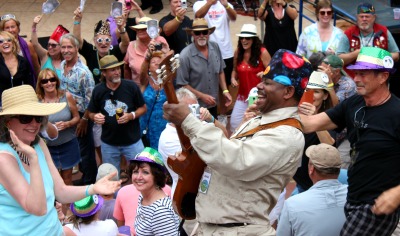
If you have never played a musical instrument, retirement is a great time to learn to play for the first time. Our daughter Skylar took up the guitar last year. I took this as an excuse to give it a try. We are both learning online.
There are hundreds of free online courses to choose from. My family can attest to the fact that not all people are destined for greatness as musicians (Skylar is picking it up pretty fast. For me it is coming slowly). However, it does seem to keep Dad occupied.
There are also a number of music festivals in Panama. Our family enjoys going to the annual Boquete Jazz & Blues Festival in Boquete, Panama.
There are more and more musicians in Puerto Armuelles these days.
You may want to join the growing expat music scene in Puerto Armueles.
My daughters are both studying tap dance and ballet. Ballet is pretty brutal on anybody, regardless of age, however, tap can be a great whole body workout for folks of any age. You can push it as far as you want.
My father had a friend named Jesse who took up tap dancing in her late 50s, and kept at it until she was in her late 80’s. She and a group of girlfriends used to travel around the east coast and perform at senior centers.
I drop my daughters off at dance class four day a week. I am meeting other parents who have decided to join their kids and take up tap dancing.
So, this week I took the plunge. I removed the taps from an old pair of throw-away tap shoes given to me by the instructor, and I used Shoe Goo to glue them onto a pair of men’s lace-up shoes.
If I decide to stick with it, I will invest in some real tap dancing shoes. Tap dancing could be the perfect hobby for this aging athlete. It is increasingly popular as a form of exercise. As with everything you can learn how online. YouTube really is a fabulous resource.
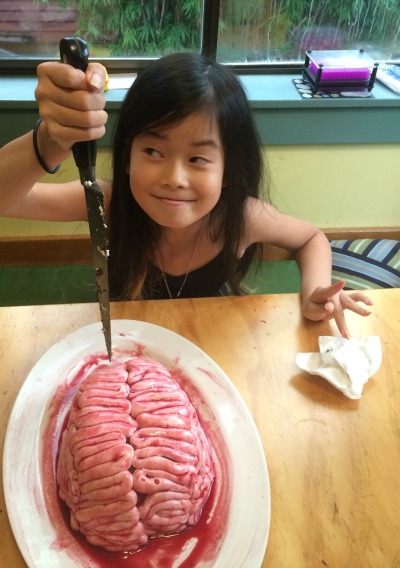
Cooking is another great hobby in retirement. There are lots of good, fresh, economical raw foods available in Panama. And you can grow your own food as well.
Once again, I can vouch for YouTube as a great place to be inspired to “raise the bar” and improve your cooking skills.
Our daughter Blaise, who is now ten, is a big fan of Youtube cooking videos.
This morning she made waffles and cinnamon rolls. Yesterday she baked raspberry filled macaroons. For Halloween, she baked a “Brain cake”. It was a chocolate velvet cake covered with cerebral looking crenelations of sugar fondant and finished with a red raspberry glaze. The cake was truly gruesome to behold. If you could get past the looks, it was delicious.
She made these all from recipes, she learned to cook on Youtube.
Panamanian Food Opportunities
You can also explore new fruits, vegetables, and dishes that are popular in Panama. For instance, we have written about:
You may also want to check out a Foodies in Panama group on Facebook.
Another popular hobby is woodworking. Several of the local expats have set up workshops in their garages or carports. One began by making all the furniture for his and his wife’s house before he graduated to making furniture for other folks.
At least one guy we know takes his craft products to the Tuesday Market in Boquete to sell (He says that this is not a path to retirement riches, but it is fun and he meets lots of nice people.)
Another craft hobby, that might or might not include woodworking, is sculpture using found objects, driftwood logs, coconuts, hard seed pods, etc.. There is an incredible number of one-of-a-kind natural shaped driftwood that washes up on the beach, especially in the rainy season.
One of our neighbors out at Corazon de Jesus has a collection of anthropomorphic shapes, and some others fish shaped (ichthyomorphic?), all gathered on morning walks on the beach in front of his house.
Volunteer work is a rewarding way to add value to one’s daily, or weekly schedule. Certainly, the happiest retirees and the happiest people that we know are those who have discovered the joy of contributing to the wellbeing of another person.
This volunteer work could be as simple as just showing up to visit or help out another older expat who needs some company. Or you might want to try volunteering as an English conversation partner. You could offer to help another expat who doesn’t have a car to do a shopping trip in town, or to David.
I’ve just scratched the surface of the types of possible hobbies and activities that could contribute to making retirement in Puerto Armuelles healthier and happier. Please write and let us know what hobbies you enjoy, and any that you would like to investigate in your retirement.
Other active hobbies include surfing, walking, bike riding, sea kayaking. These are all hobbies pursued by a number of 50, 60, and even 70 somethings in Puerto Armuelles.
Walking and cycling are best done in the early mornings before the sun gets hot. In the rainy season, this is not so critical, since there is more cloud cover, and it stays cooler.
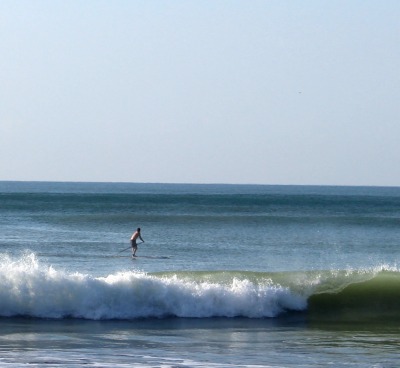
Puerto Armuelles is a perfect place to try out surfing or stand up paddle boarding for the first time. Stand Up Paddleboarding, which is an easier way to get into surfing, has arrived in Puerto.
There is also one fellow who occasionally surfs on a kayak designed for running white water rivers.
There is a technology known as a wave sled ( a sit-down kayak type surfboard with a paddle) which I have not seen in Puerto yet. This is an easier way for beginners and novices to get out and enjoy riding waves.
Little by little in Puerto we are growing a small community of old guy surfers (even a middle-aged gal or two). The waves in Puerto Armuelles are certainly not intimidating. It is a small wave surf place. A great old guy surf spot.
Of course, there are a number of world-class surf spots in both Panama and Costa Rica if you want to test your surf prowess.
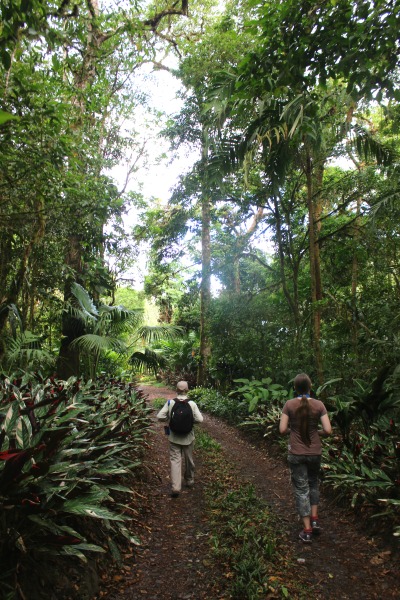
The mountains of Chiriqui are a good destination for those pursuing an outdoor hobby. It is quite easy to drive to Volcan, Cerro Punta, or even Boquete to go for a day hike in the cool mountain air.
In fact, one day I swam in the morning in the Pacific, spent the afternoon hiking in Boquete, and was back home at the beach by dinnertime.
There are some wonderful hikes and mountain bike rides to be had at higher altitudes all over Panama. We have a retired neighbor in Puerto Armuelles who belongs to a mountaineering group in Chiriqui. He is often away from Puerto Armuelles for days at a time on one adventure or another.
You can also read Betsy's post about living a healthy life in Panama.
Updated July 4, 2017
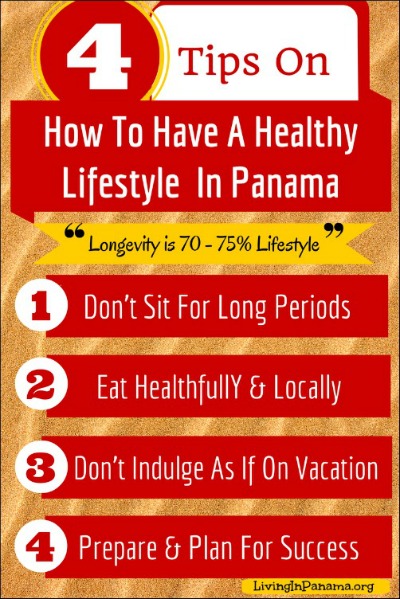
Read this post for details on how to be healthy in the tropics
While there are health food stores and gyms in many locations, they are not available everywhere. Even when they are, they might not be up to the same standard as your gym at home.
And what you eat is only one factor.
Maintaining a healthy lifestyle - with exercise - is also a challenge.
Suddenly being in a totally new culture, and often hotter climate can sometimes change an energetic and engaged person into a sedentary and lazy person. But that is easily remedied.
"We think longevity is probably about 70- 75% lifestyle."
Don't let the heat prevent you from keeping active. As the quote above indicates, you are the captain of how healthy and fit you are as you age. Your genes are not the prime reason for how you age.
You are in charge of 75% of how you will age. A key way to keep healthy and active is to keep moving. Even a regular morning jog cannot overcome the negative impact of sitting for long periods during the day.
The various studies show: no matter how "fit" subjects were, extended bouts of inactivity increased a subject's risk for:
Here are some ideas for integrating activity throughout your day.
One of the wonderful aspects of living in Panama is that nature is never far away. Go explore the tropical paradise around you, and make sure to move your body while you do it. To avoid the heat, do your most strenuous exercising in the early morning or evening hours.
You can grow your own food or buy from the many fruit and vegetable stands in Panama.
Buying your produce from street stalls is not only a great way to meet and greet people in the community, but you are supporting local business. Also, the produce is usually much cheaper than in the grocery store.
You may want to read this post about buying local produce in Panama.
In Chiriqui, we have a great resource in Finca Santa Marta. It is a 42-acre organic farm in Santa Marta, about 20 minutes west of David. They offer a wide range of organic items:
How To Shop From The Farm
Pick up Orders. You can pick up your order on Tuesdays. That is, from the Boquete Market on Tuesday morning or in Dolega or David on Tuesday afternoons. Order deadline for a Tuesday pickup: Monday at 7:00 am.
Deliveries. They offer deliveries of prepaid orders on Thursdays for any area served by Uno Express. For example, they deliver to: Bocas del Toro, Santiago, Las Tablas, Coronado, El Valle, Altos del Maria, Gorgona, La Chorrera, Panama City, Colon, and Puerto Armuelles. They also offer deliveries to Volcan on Fridays afternoons.
To initially set up deliveries, you will need to contact Richard, the bi-lingual farm manager, at 6242-9308. He is available Monday - Saturday from 7am-7pm. You will also need to set up an account on their website.
Facebook page: They have a facebook page too.
Phone Finca Santa Marta at 6242-9308 or 777-9229 or 540-560-9680 (USA cell phone) for further information.
Growing your own vegetables is also a good way to ensure you have a sufficient supply of basil, spinach, and other vegetables that you may love, but are not commonly grown or sold in Panama. You can also learn how to grow various indigenous fruits and vegetables. If you want to grow pineapples, we have a brief guide on how in this pineapple post.
Gardening is also a good way to keep active as well.
You are living in the tropics. The palm trees, coconuts, and warm sunny weather inspire all of us with visions of hanging out in a hammock sipping margaritas.
Life near the equator is more relaxed and carefree. However, sometimes new expats treat themselves as if they are on an extended vacation. The cocktail hours begins earlier and earlier in the day. Hammock time and indulging in special treats will become the norm.
While feeling like you’re on a permanent vacation is great, developing a habit of unhealthy indulgence is far from ideal. Too many indulgences can make you feel sluggish and unmotivated. It is better to develop healthy indulgences. You can try to make daily yoga, beach walks, sunset gazing, and cooking a healthy meal your new indulgences.
For most of us, the point of retiring is not to create a life of doing nothing. The idea was to engage in activities that you enjoy, to learn new activities, and to relish life.
So whatever it is you wanted to do before you moved to the tropics, do it.
Also be on the lookout for new activities and learning opportunities you can engage in.
For the most part, the more active and engaged you are more motivated and energetic you become.
Planning ahead can help you accomplish your goal of a healthy lifestyle.
Find out all the ways you can keep active. You are much more likely to keep active if you start by being active. Knowing that lapsing into a sedentary lifestyle is a danger, start scoping out your possibilities
Buy the seeds for your ideal garden. If you plan on gardening, arrange to have seeds of your favorite vegetable. Sometimes it takes a little searching to find seeds that thrive in tropical environments. Of course, you can also ask people in the area for the seeds from their produce. Ask people for tips on what grows best and how to grow those items.
Find out what organic produce is available in your area. Check out Finca Santa Marta's website and see how you can integrate their organic produce, meat, eggs, and more in your life.
Bring healthy cookbooks that have recipes featuring the produce that grows in your area. The best produce to use in your cooking is locally grown and organic. Panama offers a number of fruits and vegetables that will be new to most expats. If you like to cook, it is fun to explore these new Panamanian foods and recipes.
Discover all the different things you can do in your area.
To discover some of the outdoor pursuits you can enjoy in the Puerto Armuelles, click here. I am sure other websites have also listed activities available in their areas.
Check out more ideas for happiness-enhancing hobbies to pursue in Panama
With some planning, it will be fairly easy to achieve the tropical lifestyle you have been dreaming about.